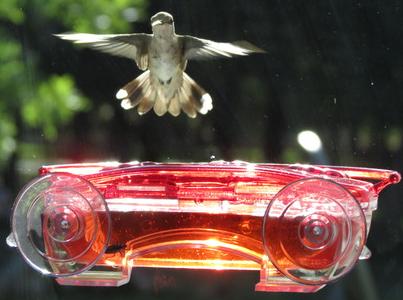
Stop Buying Red or Clear Hummingbird Food Nectar - Save 95% By Making It Yourself!
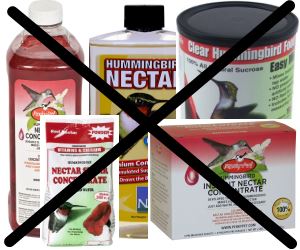 Why
are you buying hummingbird food?
Why
are you buying hummingbird food?
In the time it takes you to mix the powder or concentrate of some store-bought mix, you could have made your own that is better for the hummingbirds and so much cheaper.
Sure, you have to boil some water, but aren't the hummingbirds worth it?
For a simple recipe follow this link: How to make your own hummingbird food..
We receive a lot of questions about hummingbird food, particularly about types of sugars and sweeteners, using red dye, recipe ratios, etc.. We address all those concerns in the above article.
The information below addresses why it is absolutely unnecessary to purchase pre-made powder mixes or nectar concentrates.
Don't I Need The Red Dye To Attract Hummingbirds?
No! I have never needed to use red dye to attract hummingbirds to my feeder no matter where I have lived around the country, whether in apartments, homes, suburbs, city or otherwise.
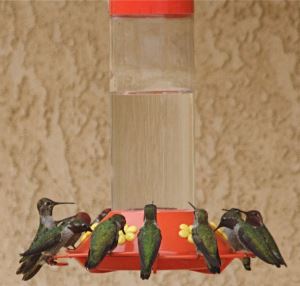 These guys certainly don't mind the
clear nectar
& easily found the feeder despite the drab surroundings and
lack of red dye.
These guys certainly don't mind the
clear nectar
& easily found the feeder despite the drab surroundings and
lack of red dye.Your feeder will undoubtedly have red parts on it. If not, embellish it with a few red ribbons, red tape, red flagging material, etc. during the first days of having the feeder out if you're not getting any takers.
Once the hummingbirds find it, they will continue to come. No red dye needed.
You can also place red-flowering plants close to the feeder to draw them in or simply a red cloth draped nearby.
Anything red placed near the feeder will suffice and easily take the place of red dye in the food.
Is The Red Dye Harmful To Hummingbirds?
I don't know. I have searched for scientific studies to prove or disprove this and have not found any. There isn't a lot of money to support such a study. Certainly the companies making nectar would not finance such a study so who would?
Scientific studies are not all about money, of course, but there has to be good reason why one would embark on such research. You will find lots of articles saying that red dye is bad for hummingbirds, but what are they basing it on? Scientific data or anecdotal evidence?
Do You Want Hummingbirds with Behavioral Problems?
There are studies linking red dye to hyperactivity and behavior problems in children. Do you want to have hummingbirds with behavior problems? Joking aside, let's just keep this simple...
Red dye is an artificial, synthetic chemical. I
may be going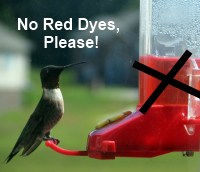 out on a
limb here, but I don't think hummingbirds need this. I certainly don't
want it in my body, so I'm not giving it to my hummingbirds.
out on a
limb here, but I don't think hummingbirds need this. I certainly don't
want it in my body, so I'm not giving it to my hummingbirds.
Additionally, these store-bought mixes often have preservatives like potassium sorbate.
Do you have potassium sorbate in your pantry?
Do hummingbird flowers have preservatives in its nectar? No. Then don't give it to hummingbirds.
This patent application for "Liquid compositions for feeding birds" from the Daisy Manufacturing Company states that the potassium sorbate preservative inhibits black mold from forming in your feeders for a longer period of time versus a homemade preparation. Probably true.
But if I have a lot of hummingbirds, I'm changing out my solution every few days anyway.
And if it's a slow period, I just don't fill my feeder up all the way. I just put out what will last a few days so mold doesn't form.
You Are Paying Up to 15x More Than The Cost of Homemade Hummingbird Food
I know these mixtures seem relatively cheap, but considering they are nothing more than sugar water you are paying so much more than you should.
The current U.S. city average retail price of sugar per pound from the Bureau of Labor Statistics is $0.607.
Below are examples of prices of popular nectar concentrates and mixes found online.
Based on the average sugar retail cost I included in the list below what it would cost to make the equivalent amount of homemade nectar.
Red Nectar Concentrate Product That Makes 1 Gallon
Red nectar concentrate: $15
1 gallon of homemade nectar: 98¢
Savings: $14.02 or 93%!
Clear Concentrate Product That Makes 1/2 Gallon
Clear concentrate (ironically less ingredients, but they charge you more for this "premium" solution): $10
1/2 gallon of homemade nectar: .49¢
Savings: $9.51 or 95%!
Red Powder Product That Makes 6 Quarts
Red powder: $7
6 quarts of homemade nectar: $1.47
Savings: $5.53 or 79%!
Clear Powder Product That Makes 4.5 Quarts
Clear powder mix: $10
4.5 quarts of homemade nectar: $1.10
Savings: $8.90 or 89%!
10 Pound Bag of Sugar
You can buy a 10 pound bag of sugar at Walmart for $6. Do you know how much nectar that would make at 1:4 ratio?
--->6.25 gallons!....for only $6!
Marketing Hype: You're Being Duped
Here are some of the "benefits" as worded by the brands that sell nectar concentrates and powder mixes:
Hype: "Contains 100-Percent high energy sucrose."
Translation: It's sugar. Sucrose is sucrose. There are no better or specialized forms of sucrose, like "high-energy".
Hype: "Contains the finest food-grade sucrose, a special solution of the perfect hummingbird sugars, providing a healthy choice and attracting power."
Translation: First off, their ingredients are: sucrose, potassium sorbate (preservative) and FDA red dye #40. So what exactly is the "special solution"? What exactly is the "finest food-grade sucrose." It's the same thing in your pantry. Again, sucrose is sucrose.
---Sidebar---
I find it frustrating that these online products want to tell you how great their hummingbird food is, but won't give you a complete list of ingredients. And when it is provided, they will list an ingredient not by it's complete name like "FDA #40 for coloring" instead of using the words, "red dye" like they are trying to fool me.
---Sidebar---
Hype: "Our mix contains no artificial sweeteners."
Translation: Well I should hope not! There are those that think hummingbirds can get diabetes from sugar syrup, so they thought it would be healthier to give them artificial sweeteners instead. Really? Some are also concerned about hummingbird tooth decay. I got nothing to say.
But It's Easier To Use A Mix
How? Even with your mix from the store, you still have to measure and mix the ingredients with water. It's not like we're making soufflé here. We're mixing water and sugar for heaven sakes!
Stay with me now: Boil water, pour the sugar in, mix, let cool. Finished. <sarcasm>I'm exhausted.</sarcasm>
Although the aforementioned patent applicant said that this homemade process is "tedious" and "messy, often resulting in sticky spills." Yes, perhaps if you're five.
Some Users Don't Use The Mixes Correctly
This concerns me even more. One reviewer stated:
"You need to measure this hummingbird nectar. Do not pour this product directly into your Hummingbird feeder. Unfortunately, the instruction for diluting the product is in small print." -Deborah
Hmmmm. I wonder how many people are using this concentrate without diluting it first? Deborah bought a 16-ounce bottle that is meant to be diluted to a half gallon, but she used it as is and hummingbirds were on the biggest sugar high ever.
Why do you think the dilution instructions are in small print? Perhaps the manufacturer doesn't want you to easily see the dilution instructions, as Deborah did not, so you use it up that much quicker and need to buy more? Just speculating, of course.
If you bought a $10 bottle that contains only 2 cups of nectar and you thought no dilution is necesary - wow! You are willing to spend top-dollar for nectar.
What If I Buy A Clear Nectar Mix?
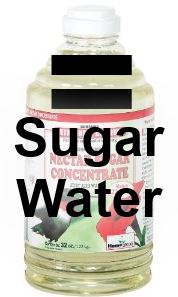 Realizing
that some bird watchers don't want the red dye, some brands began
making a clear mix so they can still take advantage of you and your
wallet.
Realizing
that some bird watchers don't want the red dye, some brands began
making a clear mix so they can still take advantage of you and your
wallet.
The clear concentrated mix still contains potassium sorbate. And why would you bother?
I like how one reviewer at Amazon came to the realization, "It's just sugar water."
And what's even worse, the clear powder and clear concentrates are priced higher than the red ones. The manufacturer's love it.
You want "better" nectar so you buy the clear. They don't have to spend money on dye and charge you more!
But Isn't White Sugar Processed and Not Natural?
White granulated sugar (table sugar) is what remains after sugar cane juice is boiled. The sucrose crystallizes and is removed from the molasses.
White sugar is sucrose which is the closest thing you can get (when diluted to a 1:4 sugar-water ratio) to the sucrose concentration found in flower nectar that hummingbirds feed upon...
NOT raw sugar, honey, fruit juice, corn syrup, molasses, agave nectar, Nutri-Sweet (please, no!), stevia, etc. etc. etc..
KISS - Keep It Simple Sugar.
Just use plain, ol' white sugar. Nothing else. Period. And as Gump would say, "That's all I have to say about that."
What About Fortified Nectar with Vitamins and Calcium? They Say Homemade Hummingbird Food Causes Soft Egg Shells!
Dave asked: I just read from another blog that using homemade hummingbird food can cause soft egg shells.
They say to use nectar mixes from stores. I know you don't believe this but do you have any thoughts on this? Thank you.
Our answer: Commercial "nectar" may be fortified with vitamins and minerals, but it is not any better than homemade sugar water.
If hummingbirds solely relied on our feeders, the commercial mixes would still not be sufficient and is not considered a complete food substitute for hummingbirds.
Hummingbirds use our feeders only as a supplement to their diet which includes nectar from flowers and eating insects.
Did the blog cite the article or information regarding the statement that "using homemade hummingbird food can cause soft egg shells"?
Unless there is a peer-reviewed scientific journal article with hard data to prove this statement, I would question it.
That's how things get spread around, like hummingbirds riding on the back of geese when migrating.
Also, by any chance does this blog sell commercial nectar? I find it strange that they would recommend hummingbird mixes because most bird organizations discourage people from using it because of artificial ingredients like red dyes.
Conclusion
I think buying hummingbird food is like buying ice when you live in an igloo - completely ridiculous!
Make your own nectar with this homemade hummingbird food recipe using plain, white granulated sugar with no dye and save a bundle!
Best Hummingbird Feeders - Our picks for the best feeders in different styles.
Hummingbird Feeder Tips - How to attract hummingbirds to your feeders, cleaning feeders, ants and bees and other pest problems, when to put up your feeders and take them down and more.
Ant
Solutions - How to keep ants out of your hummingbird feeder.
Favorite Window Hummingbird Feeder
--> View The Jewel Box Hummingbird Window Feeder
Hummingbird feeder image courtesy of Teddy Llovet.
Below are products related to this page auto-generated by Amazon. If you see any kind of hummingbird nectar product listed with red dye, please IGNORE!
|
Our Favorite Bird Watching Binoculars, Squirrel-Proof Feeder & Hummingbird Feeder Read Our Reviews: |
||
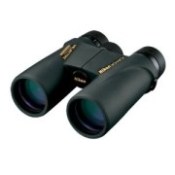
Nikon Monarch M5
Best mid-priced bird watching binoculars. Waterproof, shockproof, multi-coated ED-Glass. |
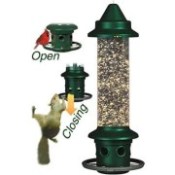
|
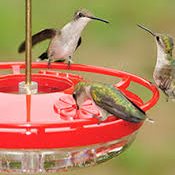
Best Hummingbird Feeder
Drip-Free, Ant-moat, Durable, Easy to Fill and Clean. |
| Click Images or Links To View More Info | ||
